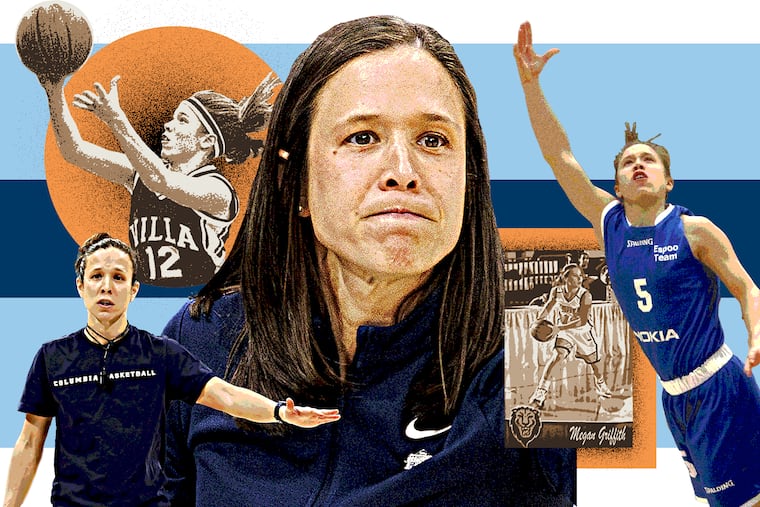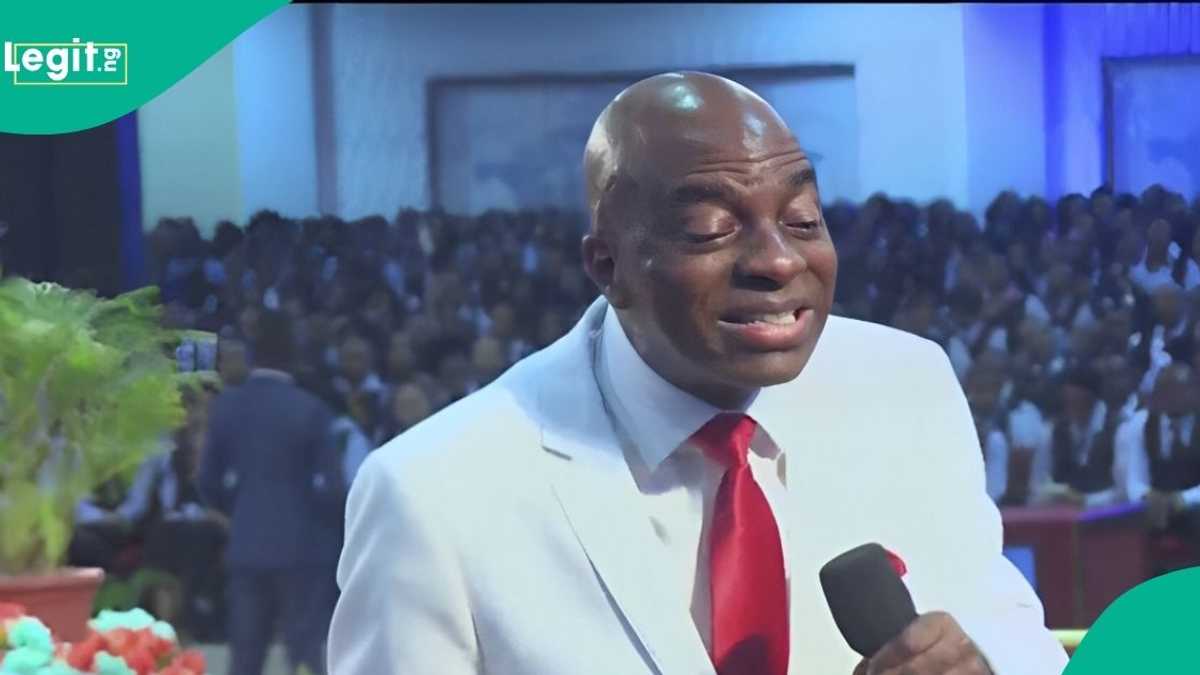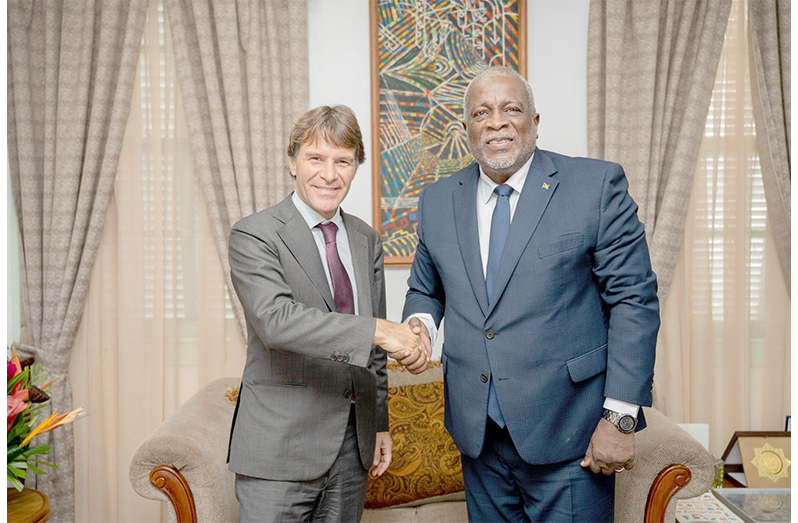Copyright The Philadelphia Inquirer

NEW YORK — As a group of Columbia women’s basketball players struggled to break a press defense and advance the ball up the court, Megan Griffith’s voice rang through the gym. “I need more active participation with your voice!” the coach said. “Can you please get back to playing like us?” That is one of the go-to phrases that Griffith, a King of Prussia native, reinforces during this October preseason practice. They are all designed to “make things sticky” and keep the team process-focused, Griffith said. “How you do anything, is how you do everything,” Griffith and standout guard Perri Page will both rattle off within the same hour. Those callbacks have fueled a remarkable turnaround as Griffith enters her 10th season as the head coach at her alma mater. Columbia was one of women’s college basketball’s worst programs for decades before clinching at least a share of three consecutive Ivy League regular-season championships and winning its first NCAA Tournament game in school history last season. » READ MORE: TJ Power is staying patient amid the hype as he gets into rhythm at Penn And it received an at-large bid to the Big Dance in each of the past two seasons, typically unheard of for Ivy League programs. The Lions are 2-0 to begin the 2025-26 season, heading into a marquee home opener against reigning Atlantic 10 regular-season champion Richmond Saturday night. Griffith, a finalist last season for the Women’s Basketball Coaches Association’s Coach of the Year award, has displayed her Philly roots while making breakthrough after breakthrough during this rebuild. There’s the influence of her high school coach, Villa Maria Academy’s Kathy McCartney, whose motivational style Griffith describes in a way that her current players now talk about her. And her childhood being raised by a father from Delaware County and a mother who immigrated from Hong Kong, before they met at Villanova. The emphasis on running a high-powered offensive system spearheaded by dynamic guard play? A no-brainer for a 40-year-old who grew up watching the Allen Iverson Sixers era. That culture has already elevated Columbia to historic heights, and a stability Griffith and players now strive to protect. Now, the coach has the Lions believing they can — again — become the best team in program history. “She’s a force,” Page said. “Honestly, do not mess with her. She is going to go out and get whatever she wants. … I can’t see myself playing for any other coach in the country.” ‘A determined little bugger’ Diane and Bob Griffith still are in awe when they watch their daughter coach, or when she speaks during news conferences. She actually was a shy kid in everyday life, taking hold of Dad’s pant leg whenever the family was out in public. But as soon as there were competitive stakes, Megan turned into “a determined little bugger,” Bob said. Diane remembers a T-ball game when a young Megan rounded third base, and the umpire told Bob, who coached Megan’s youth sports teams, that “this kid can slide better than most adult men can.” “Once that light turned on or that game clock started, she was tenacious, even as a small kid,” Bob said. “ … When you look back on it, she was probably one of the most aggressive kids out there on the court.” Megan concedes today that she probably should have pursued soccer (“Look at me. I’m 5-5,” she quips). But she gravitated toward the intimacy of smaller basketball rosters and how the game never stops moving. Neither did she, because she was fast. When Griffith first arrived at Villa Maria, McCartney remembers the teenage point guard could not always control her dribble in transition … because she literally outran the ball. So McCartney told a steely eyed Griffith that she was not ready to play on the varsity team as a freshman. She needed to learn how to mold those natural athletic gifts into a ballhandler who could anticipate the defense’s next move. Griffith clocked that, while being coached by a woman for the first time, she was receiving a similar combination of intensity and care that her father provided in those settings. “When I started getting [that tough love] from somebody else, it was like, ‘Oh, this is also how other people do this,’” Griffith said. “And it just really resonated with me. … That allowed me to really gain the confidence as a young woman, to then take that next step in my career and play college.” By her senior high school season, Griffith was the point guard and defensive menace for a team that won its first 21 games. She had chosen to play for Columbia, which does not offer athletic scholarships, over an offer from LIU-Brooklyn. And the hug McCartney and Griffith shared as she walked off the court for the final time as a high schooler has “stuck with me for years,” the coach said. “It kind of solidified in my head the difference a coach can make,” McCartney said. “And I think — I hope — it has helped her in some way. I remember whispering in her ear, ‘You’ve got big things ahead of you, girl.’" ‘I can go prove everybody wrong’ Columbia’s program was in a tumultuous state during Griffith’s playing career, from 2003 to 2007. She had four coaches in four seasons. The Lions’ record during that span was 38-70. But that is where Griffith learned how to “stack days,” not just with her on-court training but in daily habits such as nutrition and sleep. Bob watched his daughter morph from a “very predictable” freshman who was “trying to please her coach too much,” to a 1,000-point scorer and two-time All-Ivy League selection. “I was like, ‘Wow, I’ve had it the complete wrong way,’” Megan said. “I was so focused on the results all the time. Starting. Trying to come in as a freshman and change the program. I was like, ‘Wow, if I can just focus on what I can control …’” She also had an Ivy League education and a job lined up at Lincoln Financial in Philly upon graduating with an economics degree. She turned that offer down to continue playing overseas in Finland and then the Netherlands. Griffith called that experience “transformational.” She leaned into exploring her new surroundings and connecting with her local teammates. An assistant coach began involving her in game-planning and strategizing, which she said “channeled my competitive energy very differently.” She learned enough Dutch to help coach kids. When she came home during offseasons, she held youth skills clinics. “I could see just how these kids just looked up to her,” Diane said. “ … I think that was probably the first glimpse of her maybe, possibly becoming a coach.” When Megan no longer found as much satisfaction in that daily grind, she knew it was time to pivot from playing. She was hired as the director of basketball operations at Princeton, and was intrigued by then-coach Courtney Banghart, who led the program to its first Ivy League title. » READ MORE: As Big 5 women’s basketball teams hit the court, we answer your burning questions Banghart, now the coach at 11th-ranked North Carolina, quickly made Griffith the Tigers’ recruiting coordinator. Griffith was hesitant at first, instead wanting more tactical responsibilities. But she was organized and a people person. “What I learned there is that, actually, the most important thing is relationships,” Griffith said. “You have to know things and be smart. But at the end of the day, everybody can learn an offense. But what do you do with talent? How do you get talent? How do you get people that are bought into a common language, and an ethos, and a culture?” In 2016, Columbia’s head-coaching job came open. Griffith, then 30, went to athletic director Peter Pilling with a detailed plan on how she would run her alma mater. And she thought back to conversation in the car with her father, while she was still playing overseas. “[I said], ‘Dad, I feel I’m meant for something, like, big and different,’” she said. “I didn’t know what that meant at that time. So when this opportunity came up it was like, ‘Wow, I can go prove everybody wrong.’ “And I love that. I love the underdog. That’s who I am at my core.” ‘It’s why you do it’ Tyler Cordell was “a little intimidated” the first time she spoke to Griffith. While interviewing for a job as Princeton’s director of basketball operations when Griffith was promoted to assistant coach, Cordell left the phone conversation thinking, “I don’t know if I’m smart enough to follow up in her footsteps.” Now, Griffith and Cordell have worked together for 14 years. Cordell said it was a “no-brainer” to join Griffith’s staff at Columbia. Griffith calls Cordell an example of the “builders” the program needed. “You start with the people,” Griffith said. That meant thorough — and unconventional — recruiting. The coaching staff went into southern states, such as Florida and Georgia. And internationally, to Spain and Australia. Today, nine players on Columbia’s 2025-26 roster are from outside the United States. » READ MORE: Cheryl Reeve, Elena Delle Donne elected to Women’s Basketball Hall of Fame And there was perhaps nobody better to pitch Columbia than Griffith, who experienced the top-tier academics, limited athletic resources, and basketball struggles firsthand. “It’s not like we’re in the same sandbox as a lot of schools,” Griffith said. " … But we’ve never been." Griffith needed to power through the early on-court woes as a coach, including back-to-back eight-win seasons from 2017 to 2019 that left Diane worried about Megan’s health. Still, accolades began to surface. Their first victories over programs from the Atlantic Coast Conference (Boston College) and Big East (Providence). Their first Ivy League Rookie of the Year in Sienna Durr. The commitments of Abbey Hsu and Kaitlyn Davis, who became “young, hungry freshmen” and, eventually, conference champions and WNBA draft picks. Those players could emulate an on-court style — with athletic, guard-heavy rosters that could pressure defensively and get out in transition — that led to sustained success for other mid-majors. It evolved into a system that, from 2022 to 2025, averaged more than 70 points per game. Griffith, meanwhile, strives to make people feel important, even when demands are high. She will get on a player’s case during practice, but then help them make their first resumé or ask about their dog. During the COVID-19 pandemic, when Columbia’s 2020-21 season was canceled, the staff created a space for players to talk. Page actually took her recruiting “visit” on Zoom and was blown away by the staff’s energy and attention to detail in less-than-ideal circumstances. “That’s what made me say, ‘Wow, they put a lot of thought and effort into everything that they do,’” she said. “ … I was like, ‘If you can make this look good, imagine what it looks like on the court, too.’” Once the Lions returned to to play, the avalanche of checkpoints continued. “That’s what’s been so cool about our journey,” Cordell said. “Because we haven’t skipped one step.” The most recent: Last season’s NCAA First Four. The Lions at halftime flipped how they were guarding Washington’s post players, and rallied from 13 points down to win and advance to the round of 64. “It was just the next thing we had to do in our journey,” Griffith said. “I feel like we manifested it, but at the same time, it was supposed to happen. … “When the buzzer sounded, it’s why you do it. It’s why I’ve coached the last nine years — to be in that moment and be able to share that with my staff and this team.” ‘Coach-led, player-fed’ Those back home also have relished in Griffith’s rise. McCartney still texts Megan and her parents, and loves telling friends “that’s one of my kids” while watching Columbia play. Megan’s godmother, who lives in Australia, wakes up at 4 a.m. to tune in to games. Supporters are in the stands whenever Columbia plays Penn in Philly, where Griffith takes pride in those who knew her as a player recognizing similar qualities in her teams. And Diane and Bob are regular visitors to campus. While watching a recent scrimmage, they noticed Megan being “really tough” on the freshmen. Up in the coach’s offices, a veteran told one of those first-year players, “She’s tough, but you have to listen to Coach. She knows what she’s talking about.” “Yes, she yells at you a lot,” Diane said. “She screams in your face. You think she hates you. But she really does care about you, and she wants to make you a better player and person.” Like during that October practice, when new assistant coach Kizmahr Grell needed to tell Griffith to take a deep breath. The Lions have a taller roster and fewer ballhandlers this season, forcing some tweaks to their on-court identity. That was particularly apparent with Page sitting out this practice, prompting a direct challenge from Griffith to be a better leader from the sideline. “It just gets me so fired up, too,” Page said of those interactions. “ … I take it, like, this is my program. This is my baby. When she gives a task, I am ready to attack it, always. Because I want to do right for her, but I want to do right for this program, as well.” That’s an example of another Griffith callback: “Coach-led, player-fed.” It’s why a practice that began with harsh words ended with everybody gathering at midcourt for a calm circle, where players individually spoke up to encourage and hold each other accountable. They snapped in agreement of each player’s input. When Griffith asked who got better today, every player raised their hand. Those mantras have become sticky, establishing Columbia’s foundational culture. They have fueled the Lions’ historic rise. So what is the next breakthrough, with Griffith’s 10th season underway? “That’s my big challenge right now, is just continue to teach when the expectations are higher — and self-imposed,” Griffith said. “Nobody here is like, ‘Hey, you need to win more.’ Everybody is like, ‘Look at everything you’ve done,’ but that’s just not who I am. “I don’t just think we can continue to win Ivy League championships. I think we can make deep runs into March. As long as we keep getting the right people here, why couldn’t we go to the Elite Eight?”



